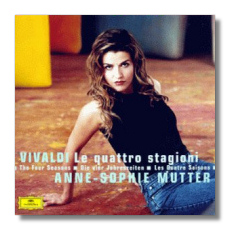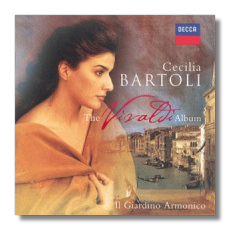
The Internet's Premier Classical Music Source
Related Links
- Vivaldi Reviews
- Latest Reviews
- More Reviews
-
By Composer
-
Collections
DVD & Blu-ray
Books
Concert Reviews
Articles/Interviews
Software
Audio
Search Amazon
Recommended Links
Site News
 CD Review
CD Review
Antonio Vivaldi

Concertos & Arias
- Antonio Vivaldi: The Four Seasons, Op. 8 #1-4 (1725)
- Concerto for Violin "La primavera" in E Major, RV 269
- Concerto for Violin "L'estate" in G minor, RV 315
- Concerto for Violin "L'autunno" in F Major, RV 293
- Concerto for Violin "L'inverno" in F minor, RV 297
- Guiseppi Tartini: Sonata for Violin "Il trillo del Diavolo" in G minor (1749) (arr. Zandonai)
Anne-Sophie Mutter, violin
Trondheim Soloists/Anne-Sophie Mutter
Deutsche Grammophon 463259-2 DDD 62:50

The Vivaldi Album

- Dorilla in Tempe, RV 709: "Dell 'aura al sussurrar"
- Farnace, RV 711: "Gelido in ogni vena"
- La fida ninfa, RV 714: "Dite Ohimè"
- L'Olimpiade, RV 725: "Siam navi all'onde algenti"
- L'Orlando finto pazzo: "Anderó, Voleró, Grideró"
- Il Teuzzone, RV 736: "Di trombe guerriere"
- Ercole sul Termodonte, RV 710: "Zefiretti che sussurate"
- Guistino, RV 717:
- "Sventurata navicella"
- "Ho nel petto un cor si forte"
- La fida ninfa, RV 714: "Alma oppressa"
- Bajazet, RV 703: "Tamerlano: Anche il mar par che sommerga"
- Griselda, RV 718: "Dopo un orrida procella"
- Di due Rai languir costante
Cecilia Bartoli, mezzo-soprano
Il Giardino Armonico
Arnold Schoenberg Choir/Giovanni Antonini
Decca 466569-2 DDD 66:37
It doesn't hurt CD sales, I'm certain, that Anne-Sophie Mutter and Cecilia Bartoli are attractive young women. Is it a coincidence that both of them have released Vivaldi discs at about the same time?
Comparisons between these two CDs are unavoidable. Mutter's disc is clearly meant to be fun. Photographs show her cavorting with the gentlemen of the Trondheim Soloists (Trondheim is in Norway, for those of you who were sleeping in World Geography!), and the colorful paintings of German artist Gotthard Graubner supposedly inspired Mutter's interpretations. What is surprising, then, is that there is so little that is surprising about these Four Seasons. In some ways, this is meant as praise. Mutter's musicianship is beyond reproach, and she and the Trondheim Soloists go beyond and beneath and behind the notes to realize Vivaldi's creativity. It has, however, become fashionable to interpret the score. Hearing a new recording of it is like watching someone play pinball: you know they're going to score as many points as possible, but you're never exactly sure where the little metal ball is going to go. The compulsion to do something different with Vivaldi's music with each new performance and recording has the perhaps unanticipated effect of making The Four Seasons seem more and more like a familiar battlefield than a land of opportunity.
"Autumn" is a good place to start if you want to get an idea of the Mutter/Trondheim approach. The first movement starts off conservatively, but soon tempos get pulled around so much that the listener begins to feel like he is the composer's drunkard. The musicians tiptoe around the middle movement's snoring drunks (so as not to wake them?) and the effect is almost refined. The hunt that follows sounds as if it is taking place in Handel's England, not Vivaldi's Italy. At any rate, one doubts that these hunters are peasants – the nobles must have come to the country for the day to shoot grouse.
Early in her career, Mutter recorded this music with Herbert von Karajan. That interpretation, so smooth and mellow, was all about the conductor; Vivaldi and Mutter were subservient to his quest for upholstered sound. If anything, Mutter has gone to the opposite extreme this time around. It is an interesting reading, and it will satisfy, although I don't think it sets out to accomplish everything that it intends. The Tartini is well-fed and similarly conservative, for all its surface idiosyncrasies. This CD is like the lawyer who wears a single stud in his right earlobe. The winking and nudging conversation between Mutter and writer Harald Wieser that's included the booklet contains phrases such as "Open sesame!" and "If only we had a bottle! I'd be happy to open it to thank you for your kind remarks." Yes indeed.
Cecilia Bartoli's aria collection, while it comes with less of a fanfare, must be heard to be believed. Her singing on this CD is chin-droppingly brilliant, and if she never recorded anything else before or after The Vivaldi Album, her work here would be sufficient to place her in the vocal pantheon anyway. She negotiates the most incredibly florid passages with imperious authority, and she sings with the passion that other mezzos reserve for Amneris or Eboli. She spits out the phrases of "Anderò, volerò, griderò" (from L'Orlando finto pazzo) like nails; this is a side of Cecilia Bartoli that is new to me, and I like it.
Bartoli seems to be on a quest to revive Vivaldi's operas, and if I understand Decca's notes correctly, she herself researched material for this CD in Turin's National Library. It was well worth it. Six of the thirteen arias have been unrecorded until now, and there's not an aria in this collection that is anything less than fascinating. Stunning coloratura showpieces (try "Anch'il mar par che sommerga" from Bajazet) rub shoulders with charming pastoral arias and melancholy airs. Vivaldi's writing tends to treat the voice like a violin, and as such, it can be cruelly difficult (but rewarding). Two of the arias ("Dell'aura al sussurrar" from Dorilla in Tempe and "Gelido in ogni vena" from Farnace) share material with The Four Seasons (the first movements of "Spring" and "Winter," respectively). Although the vocal writing deservedly holds the spotlight, there are many felicitous instrumental touches too. The baying horns of "Dopo un'orrida procella" from Griselda are unforgettable, and what a wonderful contrast there is between them and a pair of pertly piping flageolets (small recorders with a very high pitch) in "Di due rai languir costante." (The source of this aria hasn't been determined.)
As I've already mentioned, Bartoli is brilliant – a goddess, really – and Il Giardino Armonico matches her step-by-step. They are an Italian original instruments ensemble, and evidently comprised of nothing but virtuosos.
Without Bartoli's star status, this CD probably would not have been made, even if a record label had been able to find another singer who can do what she does here. Bartoli has used her fame well here; it would have been easy to cash in with another disc of overly beloved material. In not taking the easy way out, she has blessed herself and all of us.
Copyright © 2000, Raymond Tuttle




















